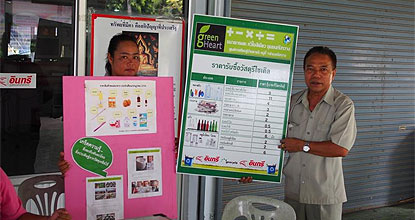
Thirty-five-year-old village headman Sakchai Pasi has lived in Saraburi's Baan Kaoman community since birth. Most of the villagers earn their living growing crops, and water scarcity used to be a problem during the dry season.

SCCC buys several kinds of garbage at different prices from Saraburi communities.
"In the past, the community faced water scarcity, but not any more," said Mr Sakchai, citing joint efforts of the villagers and Siam City Cement Plc (SCCC) over the past four years to improve the environment around a cement factory in tambon Tabkwang.
With help from SCCC, Thailand's second-biggest cement maker, the villagers have gained the know-how to make their community greener.
For instance, SCCC joined with villagers to build tanks to store water during the rainy season for use during the dry season. Now the villagers own their own brand of drinking water for sale within the community.
For better sanitation, a community waste bank opens on the first Saturday of each month to buy garbage from the villagers.
"Previously our waste management was disorganised, until SCCC came to share with us a more efficient method through the waste bank," Mr Sakchai said.
The waste bank reduces rubbish and provides the village with 3,000 baht a month, and the revenue is transferred to the community fund for necessities such as funerals and taking care of the elderly.
Helping the surrounding community is part of SCCC's efforts to achieve a Green Industry Level 5: Green Network rating, the highest level under a system introduced by the Industry Ministry in 2011.
Back then, the ministry encouraged factories nationwide to enact eco-friendly policies.
In late 2012, SCCC was the first industrial operator in Saraburi rewarded with a Green Industry Level 4: Green Culture designation, which denotes the cooperation of all employees in the company to support a greener environment until it becomes part of the culture.
Green Network, meanwhile, designates industries as eco-friendly not just within the company but also with stakeholders such as the surrounding communities and consumers.
"We've been in the green industry for more than 40 years, not just recently," said Siva Mahasandana, SCCC's senior vice-president for Saraburi operations.
He said all executives and employees had a passion for SCCC's green culture.
"Although there is a cost for green industry, we're always willing to pay to be a role model for other industries," Mr Siva said.
Chalorsak Sangkloy, SCCC's community relations manager, said the company gives 3 million baht to the Baan Kaoman community each year to support green activities.